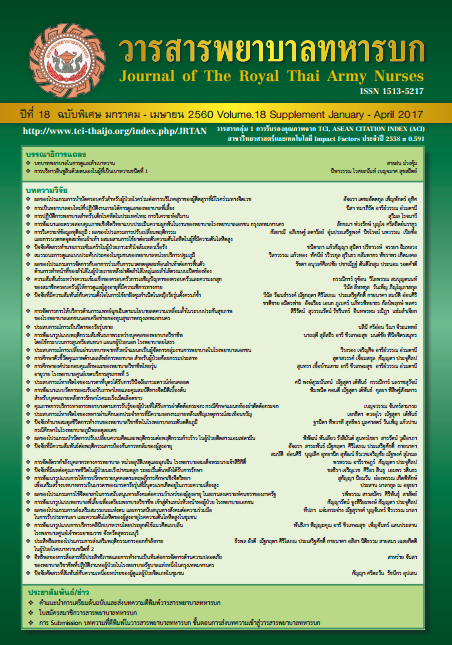ประสิทธิผลของโปรแกรมการส่งเสริมพฤติกรรมการออกกำลังกายในผู้ป่วยโรคเบาหวานชนิดที่ 2
Keywords:
ประสิทธิผล, โปรแกรมการส่งเสริมพฤติกรรมการออกกำลังกาย, ผู้ป่วยโรคเบาหวานชนิดที่ 2, Effectiveness, Exercise Behaviors Promotion Program, Diabetes Mellitus Type 2 PatientsAbstract
การวิจัยกึ่งทดลองครั้งนี้มีวัตถุประสงค์ เพื่อศึกษาประสิทธิผลของโปรแกรมการส่งเสริมพฤติกรรมการออกกำลังกายในผู้ป่วยโรคเบาหวานชนิดที่ 2 โดยประยุกต์ใช้ทฤษฎีสมรรถนะแห่งตน กลุ่มตัวอย่างที่ศึกษาเป็นผู้ป่วยโรคเบาหวานชนิดที่ 2 อายุ 30-59 ปี ที่มารับบริการโรงพยาบาลปทุมธานี จังหวัดปทุมธานี โดยใช้วิธีการสุ่มอย่างง่าย จำนวน 60 คน จับฉลากแบ่งเป็นกลุ่มทดลอง และกลุ่มควบคุม กลุ่มละ 30 คน โดยกลุ่มทดลองได้รับโปรแกรมการส่งเสริมพฤติกรรมการออกกำลังกาย ประกอบด้วยกิจกรรมส่งเสริมการรับรู้สมรรถนะ แห่งตน และความคาดหวังผลดีในการออกกำลังกาย จากการวางแผนการออกกำลังกายฝึกบันทึกติดตามพฤติกรรม และปฏิบัติให้สำเร็จด้วยตนเอง รวมถึงการได้เห็นตัวแบบ การเรียนรู้จากรูปแบบการออกกำลังกายที่เหมาะสมกับโรค การชักจูงใจด้วยคำพูด การกระตุ้นทางด้านร่างกายและอารมณ์ ให้มีความมั่นใจในการปฏิบัติ ส่วนกลุ่มควบคุมได้รับกิจกรรมตามที่โรงพยาบาลกำหนด เก็บรวบรวมข้อมูลโดยใช้แบบสอบถามก่อนและหลังการทดลอง วิเคราะห์ข้อมูลด้วยสถิติเชิงพรรณนา การทดสอบด้วย Chi-square Test, Fisher’s exact test, paired t-test และ independent t-test. ผลการวิจัยพบว่า โปรแกรมการส่งเสริมพฤติกรรมการออกกำลังกายมีประสิทธิผลทำให้เกิดการเปลี่ยนแปลงคะแนนเฉลี่ยพฤติกรรมการออกกำลังกายในผู้ป่วยโรคเบาหวานชนิดที่ 2 เพิ่มขึ้นกว่าก่อนการทดลองและสูงกว่ากลุ่มควบคุมอย่างมีนัยสำคัญทางสถิติที่ระดับ .05
The Effectiveness of Exercise Behaviors Promotion Program of Diabetes Mellitus Type 2 Patients
This quasi-experimental research aimed to study the effectiveness of exercise behaviors promotion program of diabetes mellitus type 2. Self-Efficacy Theory was used as a conceptual framework in this study. The study groups were 60 persons with diabetes mellitus type 2 which ages 30-59 years and received medical care at Pathum Thani hospital, Pathum Thani Province. Participants were simple random sampling to either the experimental group (n = 30) or the control group (n = 30). The experimental group received the Exercise behaviors promotion program such as self-efficacy promotion and good outcome expectation in exercise include the exercise plan, practice track record behavior, enactive mastery experiences, vicarious experience, learning the suitable exercise pattern for the disease, verbal persuasion and stimulate the physiological and affective states. The control group received activity as defined by the hospital. Questionnaire was used as an instrument in this study. Data was collected at before and after implementing the program. Data analyzed by using Descriptive statistics, Chi-square Test, Fisher’s exact test, paired t-test and independent t-test. The study results showed that after participating in the exercise behaviors promotion program, the experimental group had higher mean scores in exercise behavior than before participating in the program and those in the control group at α .05 significant level. It concludes that the exercise behaviors promotion program developed by the researcher can effectively promote exercise behavior among patients with diabetes mellitus type 2.
Downloads
Downloads
How to Cite
Issue
Section
License
บทความหรือข้อคิดเห็นใดใดที่ปรากฏในวารสารพยาบาลทหารบกเป็นวรรณกรรมของผู้เขียน ซึ่งบรรณาธิการหรือสมาคมพยาบาลทหารบก ไม่จำเป็นต้องเห็นด้วย
บทความที่ได้รับการตีพิมพ์เป็นลิขสิทธิ์ของวารสารพยาบาลทหารบก
The ideas and opinions expressed in the Journal of The Royal Thai Army Nurses are those of the authors and not necessarily those
of the editor or Royal Thai Army Nurses Association.






